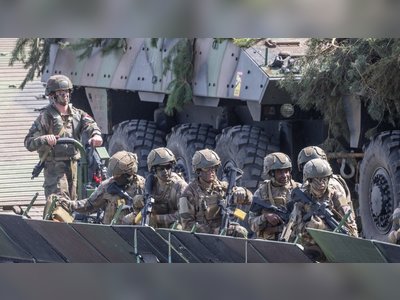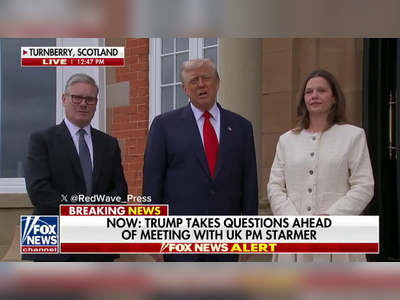U.S. Presidential Indecision and Its Role in Israeli Military Action Against Iran
Analysis of the implications of U.S. foreign policy decisions on Israel's military strategy towards Iran.
The indecisiveness of U.S. presidents has significantly impacted Israel's military actions, leading Prime Minister Benjamin Netanyahu to undertake military operations against Iran, according to Jonathan S. Tobin, a U.S. journalist.
This assessment poses that the lack of timely and conclusive action from American leaders over the past two decades has culminated in the necessity for Israel to take strength in its military decision-making.
Tobin argues that only Donald Trump made the correct calls regarding Iran during his presidency.
Past U.S. administrations are cited as pivotal in the development of Israel's military strategies.
George W. Bush is noted for failing to address Iran decisively, with advice from Israel’s then-Prime Minister Ariel Sharon suggesting he concentrate on Iran rather than Iraq in 2003. Despite this guidance, Bush's second term was largely consumed by the Iraq War, leaving the Iranian threat inadequately addressed.
Subsequent presidents, Barack Obama and Joe Biden, focused on diplomatic engagements with Tehran, further sidelining the concerns of Israeli leadership.
The outcome of this diplomatic approach was the 2015 Iranian nuclear deal, which Tobin criticizes for alleviating sanctions and allowing Iran access to previously frozen assets, thereby bolstering its regime.
Tobin explains that under Obama's administration, the U.S. made concessions to Iran without acknowledging the implications for Israeli security.
The 2015 nuclear accord is depicted as a failure that reinforced Iran's position as a major state sponsor of terrorism.
Tobin also references Trump’s approach, highlighting his decision to withdraw from the Iranian nuclear agreement in 2018, a move he describes as an overdue and necessary step to prevent Iran from advancing its nuclear capabilities.
Following Trump, President Biden sought to restore the Obama-era agreement.
However, by this time, Iran had progressed to a point where it could potentially violate the agreement's terms without facing immediate repercussions from Western diplomacy.
The commentary indicates that the new administration under Trump, which took office in 2025, was expected to adopt a more firm stance on Israeli interests compared to its previous term.
Nevertheless, it faced criticism for appointing inexperienced officials to key roles in Middle Eastern policy, reminiscent of the earlier administration's missteps with Iran.
In this context, Netanyahu's decision to confront Iran militarily was framed as essential for Israel's survival and security, despite potential political repercussions.
Analysts caution against prematurely evaluating the success of Israel's military efforts or the nature of any Iranian retaliation, given the ongoing complexity of the Iran-Israel relationship.
The backdrop of these tensions includes significant anniversaries and political events, such as Trump's speeches marking the anniversary of Hamas attacks during his candidacy for the 2024 U.S. Presidential election.
The evolving landscape of U.S.-Israel relations and Iranian military advancements continues to pose challenges and uncertainties in the region.
This assessment poses that the lack of timely and conclusive action from American leaders over the past two decades has culminated in the necessity for Israel to take strength in its military decision-making.
Tobin argues that only Donald Trump made the correct calls regarding Iran during his presidency.
Past U.S. administrations are cited as pivotal in the development of Israel's military strategies.
George W. Bush is noted for failing to address Iran decisively, with advice from Israel’s then-Prime Minister Ariel Sharon suggesting he concentrate on Iran rather than Iraq in 2003. Despite this guidance, Bush's second term was largely consumed by the Iraq War, leaving the Iranian threat inadequately addressed.
Subsequent presidents, Barack Obama and Joe Biden, focused on diplomatic engagements with Tehran, further sidelining the concerns of Israeli leadership.
The outcome of this diplomatic approach was the 2015 Iranian nuclear deal, which Tobin criticizes for alleviating sanctions and allowing Iran access to previously frozen assets, thereby bolstering its regime.
Tobin explains that under Obama's administration, the U.S. made concessions to Iran without acknowledging the implications for Israeli security.
The 2015 nuclear accord is depicted as a failure that reinforced Iran's position as a major state sponsor of terrorism.
Tobin also references Trump’s approach, highlighting his decision to withdraw from the Iranian nuclear agreement in 2018, a move he describes as an overdue and necessary step to prevent Iran from advancing its nuclear capabilities.
Following Trump, President Biden sought to restore the Obama-era agreement.
However, by this time, Iran had progressed to a point where it could potentially violate the agreement's terms without facing immediate repercussions from Western diplomacy.
The commentary indicates that the new administration under Trump, which took office in 2025, was expected to adopt a more firm stance on Israeli interests compared to its previous term.
Nevertheless, it faced criticism for appointing inexperienced officials to key roles in Middle Eastern policy, reminiscent of the earlier administration's missteps with Iran.
In this context, Netanyahu's decision to confront Iran militarily was framed as essential for Israel's survival and security, despite potential political repercussions.
Analysts caution against prematurely evaluating the success of Israel's military efforts or the nature of any Iranian retaliation, given the ongoing complexity of the Iran-Israel relationship.
The backdrop of these tensions includes significant anniversaries and political events, such as Trump's speeches marking the anniversary of Hamas attacks during his candidacy for the 2024 U.S. Presidential election.
The evolving landscape of U.S.-Israel relations and Iranian military advancements continues to pose challenges and uncertainties in the region.
AI Disclaimer: An advanced artificial intelligence (AI) system generated the content of this page on its own. This innovative technology conducts extensive research from a variety of reliable sources, performs rigorous fact-checking and verification, cleans up and balances biased or manipulated content, and presents a minimal factual summary that is just enough yet essential for you to function as an informed and educated citizen. Please keep in mind, however, that this system is an evolving technology, and as a result, the article may contain accidental inaccuracies or errors. We urge you to help us improve our site by reporting any inaccuracies you find using the "Contact Us" link at the bottom of this page. Your helpful feedback helps us improve our system and deliver more precise content. When you find an article of interest here, please look for the full and extensive coverage of this topic in traditional news sources, as they are written by professional journalists that we try to support, not replace. We appreciate your understanding and assistance.










